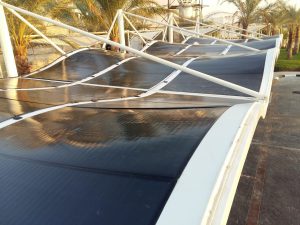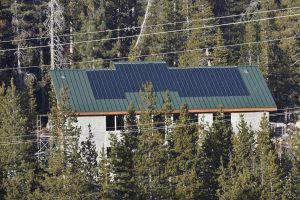Most of the solar panels that are installed in the United States are made of silicon photovoltaic (PV) cells, but silicon PV doesn’t work for every situation. Thin film solar panels are an alternative that’s starting to take hold, particularly in situations where rigid PV panels aren’t an option.
MiaSolé is a Santa Clara-based thin film solar panel manufacturer owned by the Chinese multinational renewable energy company Hanergy. They manufacture flexible thin film solar panels made of copper indium gallium selenide, also known as CIGS.
Everything you need to know about MiaSolé solar panels
EnergySage spoke with a representative from MiaSolé to learn more about their flexible solar panels.
Technology
A conventional solar PV panel measures at approximately 3 feet by 5 feet and is around 1.5 inches thick. For a standard rooftop or ground-mounted solar panel system, that’s not a problem, but there are some special situations where you may want a system that is thinner, more flexible, and/or less heavy.

MiaSolé offers a flexible CIGS solar module that adheres directly to surfaces, making it an ideal option for things like curved structures and metal roofs. They are also lightweight, especially when compared to conventional solar PV panels, which means they may be used in situations where a structure can’t support the full weight of a conventional system. Other thin film modules are encased in glass, negating some of the benefits of thin film.
Most thin film solar panels are less efficient than their silicon PV counterparts. CIGS thin film solar cells, however, have a similar cell efficiency to silicon PV solar cells – as far as thin film technology goes, CIGS solar panels are one of the most efficient options available. MiaSolé cells offer an average efficiency 17.5 percent.
Cost
Typical CIGS solar modules are significantly more expensive than standard silicon PV panels. However, they don’t require racking or brackets to mount them to the roof, which can reduce installation costs. According to MiaSolé, their total installation costs are typically around 80 percent of that of silicon PV panels. However, the modules themselves are more expensive.
Regardless of the solar panel technology you’re considering, you should always compare options from multiple installers before making a final decision. You can use the EnergySage Marketplace to easily get quotes from local installers offering different options near you.
Manufacturing
According to the company, MiaSolé has a manufacturing facility at its headquarters in California, and also manufactures in China. Typically, panels sold in the U.S. and European markets come from the Santa Clara HQ facility. If manufacturing location is an important consideration, you can specify that when you order.
Warranties
Solar panel manufacturers offer two main warranties for their products – a workmanship warranty and a production warranty.
The workmanship warranty is the manufacturer’s guarantee against product defects. The industry standard is 10 years, and some manufacturers offer 15 or even 25-year workmanship warranties. MiaSolé only offers a 5-year workmanship warranty.
The production warranty is the manufacturer’s guarantee that your panels won’t lose their ability to produce electricity too quickly (every solar panel loses some generating capacity over time.) MiaSolé guarantees that their panels will produce at least 90 percent of their original ability after 10 years, and at least 80 percent after 25 years. This is in line with the industry standard, although many companies will offer a more detailed warranty that specifies annual production capacity.
Availability
MiaSolé has resellers across the U.S., and customers can also request their solar panels directly through the company’s website. However, MiaSolé and other thin film solar panel manufacturers won’t be as widely available as a standard silicon PV option.
Thin film vs. silicon PV: which is right for you?

If you have a non-standard roof or other structure where you want to install solar, and if you don’t mind a price premium for aesthetics, then thin film solar like MiaSolé’s flexible panels could be the right fit for you. For example, properties with metal roofs are often good candidates for thin film solar panels, because the panels can fit in between the roof’s seams. (You can read more about thin film solar panels, and whether they make sense for your property, in EnergySage’s thin film solar overview.)
The best way to be confident in your solar decision, whether you’re considering thin film, silicon PV, or both, is to compare offers from solar installers in your area. On the EnergySage Marketplace, pre-vetted solar installers will prepare customized quotes for your home at no cost to you. You can use EnergySage’s side-by-side tables to make an accurate comparison of all of your options – and if you already have a quote from an installer, you can upload that to compare it as well.






